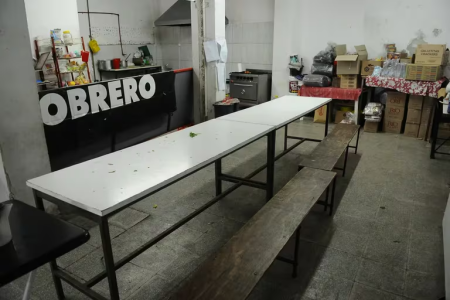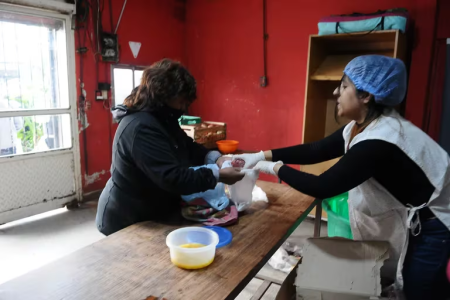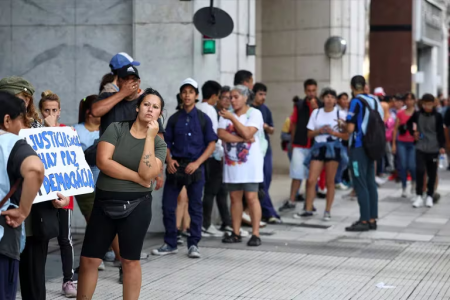All the Answers
Well-known member
“Ghost eaters”: the Government denounced “a systematic plan to commit acts of corruption against the Argentine people” - Infobae

Source:
May 21, 2024
Pettovello's portfolio confirmed before the court that “almost half” of the places where the picketers distributed food “do not exist” and presented more evidence. They described the mechanism that would involve former officials. Peronist picketers organize a protest in front of the Ministry of Human Capital
By Andres Klipphan

The Government denounces that half of the soup kitchens did not exist to receive food and returns to the charge against the picketers. Photo: Maximiliano Luna
The Ministry of Human Capital ratified the criminal complaint it made after verifying that almost 50% of the canteens run by the social movements and picketers, which the previous Government assisted with “fresh food”, were non-existent, they stopped working , their references moved neighborhoods, or their addresses did not exist.
Yesterday, after presenting more evidence that would implicate social leaders and former officials of the Government of Unión por la Patria linked to the distribution of food to community canteens and picnic areas that “were not validated,” they maintained in the Comodoro Py courts that the evidence collected and the audits ordered by Minister Sandra Pettovello, leads them to conclude that: “All this appears to be a systematic plan to commit various acts of corruption against the Argentine people , violating human rights such as food, freedom, dignity and work of the most vulnerable sectors.”
The suspicion is that the social leaders continued receiving the food items despite the place being closed. Among the documentation provided, it is maintained that “ several soup kitchens were registered by different social organizations .” According to the audits ordered by Minister Pettovello, only 8% of these food items, which came from the warehouses of the former Social Development portfolio, were surrendered.
“Only 52.3% of the dining rooms could be surveyed. The remaining 47.7% no longer function as such; 25% of the addresses do not exist or a snack bar never worked.”
In the judicial presentation, which fell to the court of Ariel Lijo , and which is delegated to the federal prosecutor's office of Ramiro González , they are called "ghost eaters."
Yesterday, Leila Gianni , legal undersecretary of Human Capital, in addition to ratifying the complaint, presented new documentation that would confirm that thousands of tons of food had a destination that was at least uncertain.
The letter emphasizes that since then the Ministry of Social Development had not monitored the food that was supposed to be destined for the most vulnerable families.

The Ministry of Human Capital, headed by Sandra Pettovello, ratified her complaint about the non-existence of almost 50% of the canteens Photo NA
Officials and social leaders
“These canteens, which were in the National Registry of Canteens and Picnic Areas (RENACOM) were represented by social organizations, these being the ones that received the dry food or money, depending on the case. Once money or food was received, there was no control by the national State over whether the soup kitchens that these organizations claimed to represent actually received the food. According to what was provided in this case, it can be seen that many of the non-existent soup kitchens were represented by "These are the ones they claimed to assist," he said in the ratification of the complaint in which he requests an investigation of the alleged "noncompliance with the duties of a public official" and "fraud against the Public Administration."
The legislation requires that the officials who authorized the release of these essential supplies had to have “traceability ,” that is, to which canteens they were destined, who was responsible for the establishments, and how many people were served. According to Capital Humano, in 92% of cases that did not happen.
A week ago, Pettovello's portfolio presented Excel spreadsheets to prosecutor Ramiro González with 1,201 “non-validated” places , their addresses and the organizations that registered them in the National Registry of Dining Rooms and Picnic Areas (RENACOM), which was under the orbit of the leader of La Cámpora Laura Alonso , the then Secretary of Social Inclusion.

Daniel Arroyo, Juan Zabaleta and Tolosa Paz, the Ministers of Social Development of Alberto Fernández
In the Casa Rosada they are convinced that the bags of food that should be destined for the most vulnerable, were used as a tool of extortion , as was reflected in the case for "extortion" investigated by prosecutor Gerardo Pollicita ; or they were sold, as was also denounced in that file that has as accused 28 leaders of the Polo Obrero, the Front of Organizations in Struggle (FOL) and Barrios de Pie and in which the “secret of summary” was imposed and it was accepted as a complainant to the Ministry of Human Capital, headed by Sandra Pettovello .
The social organizations linked to the 1,201 “non-validated kitchens” are linked to organizations such as the Evita Movement led by Emilio Pérsico (former Secretary of Social Economy); the CTEP and the MTE referenced with Juan Grabois ; the Classist and Combative Current (CCC) coordinated by former Kirchnerist deputy Juan Carlos Alderete ; Barrios de Pie whose national coordinator is the former also former official of the Social Development Portfolio, Daniel Menéndez and Eduardo Belliboni , leader of the Polo Obrero.
“A systematic plan”
From Capital Humano they reminded the prosecutor that "the regulations of the National Public Administration establish that, if there are pending accounts with the National State, of funds received, having expired the deadlines for their presentation, it cannot be continue receiving money” , as, the new Government suggests, happened during the administration of Alberto Fernández.
Its three Ministers of Social Development were: Daniel Arroyo , Juan Zabaleta and Victoria Tolosa Paz .
“It can be observed once again how these social organizations, raising the flag of social justice, profited from the hunger of the most vulnerable sectors ,” maintains the Human Capital portfolio in ratifying the complaint and providing new evidence about the alleged corrupt circuit that would involve former officials and social leaders.
“Likewise, many of these organizations were recently created cooperatives, without any history, and received authorization through the National Institute of Associativism and Social Economy (INAES) which was headed by another Evita leader, Alexandre Roig .

“Some of those canteens existed and many others did not, or some stopped working, and no state authority detected them,” Maximiliano Luna maintains before the prosecutor's office from Capital Humano.
“Once they received such authorization, they appeared at the Ministry of Social Development to request lines of credit, in different matters, food, overalls - facts that were already reported and processed in this jurisdiction, but not linked to the present (case). All of this indicates that it appears to be a systematic plan to commit several acts of corruption against the Argentine people , violating human rights such as food, freedom, dignity and work of the most vulnerable sectors,” the complaint added.
For the officials of La Libertad Avanza, the social leaders were the “intermediaries between the State's social assistance and the real beneficiary (...) It was the social organizations that agreed with the National State with the excuse of representing a number of soup kitchens registered in RENACOM.”
From Capital Humano they warned the prosecutor in the case that “some of those canteens existed and many others did not, or some that stopped working, and no state authority detected them .” "Even so - it was argued before the prosecution - there were canteens that existed and that were duly registered and responded to a social organization, in the Human Capital audits referring to said canteens they reported never having received any type of food. Nor was there a systematized database that contained all the information; the number of people who attended the soup kitchens declared on the registration forms had not been controlled and that, based on that number, the organization requested kilos of food from the State. food and transfer of money to purchase food.”

Social movements will hold "the dining room line" in front of the Ministry of Human Capital REUTERS/Agustin Marcarian
From the legal undersecretary of Human Capital they also assured prosecutor González that in the former Ministry of Social Development: “ There was no control that referred to the existence of any type of incompatibility that would make said granting of assistance legal. It is not corroborated whether the heads of social organizations were officials of any State agency.”
With the criminal case in full judicial process, the main social organizations grouped in the Popular Economy Workers Union (UTEP), anticipated that this week - it is possible on Thursday - they will hold a protest in front of the Ministry of Human Capital, located in Carlos Pellegrini 1285. The measure is called “the dining room row.” They want Minister Pettovello and her collaborators to “attend and register each dining room and snack bar that is not receiving assistance from the State.” The same action promises to be carried out “simultaneously and in various delegations of the Secretary of Children and Family – formerly Social Development – throughout the country.”
Pettovello will not receive them and has already announced that he will not send fresh food to the “registered” canteens as the Fernández administration did, but rather he will carry a card from the Alimentar Comunidad program so that the canteen representatives can buy “the food they need, and a “Once the accounts are rendered, it is charged again.”

